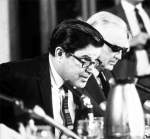 In the early 1970s, American newspapers published investigations into intelligence-gathering methods used by the Federal Bureau of Investigation (FBI), the Central Intelligence Agency (CIA), the US Army and other government bodies during the Cold War. These articles contained allegations about intelligence-gathering abuses, including claims of government officials needlessly spying on American civilians. Under pressure from the press and the public, the United States Senate formed the Select Committee to Study Governmental Operations with Respect to Intelligence Activities. It became known as the Church Committee after its chairman, Frank Church, a Democratic senator from Idaho (pictured). The Church Committee handed down a series of reports in late 1975 and 1976. In this particular report, the committee suggested the FBI, CIA and other bodies had “adopted tactics unworthy of a democracy and occasionally reminiscent of totalitarian regimes”:
In the early 1970s, American newspapers published investigations into intelligence-gathering methods used by the Federal Bureau of Investigation (FBI), the Central Intelligence Agency (CIA), the US Army and other government bodies during the Cold War. These articles contained allegations about intelligence-gathering abuses, including claims of government officials needlessly spying on American civilians. Under pressure from the press and the public, the United States Senate formed the Select Committee to Study Governmental Operations with Respect to Intelligence Activities. It became known as the Church Committee after its chairman, Frank Church, a Democratic senator from Idaho (pictured). The Church Committee handed down a series of reports in late 1975 and 1976. In this particular report, the committee suggested the FBI, CIA and other bodies had “adopted tactics unworthy of a democracy and occasionally reminiscent of totalitarian regimes”:
“Americans have rightfully been concerned since before World War II about the dangers of hostile foreign agents likely to commit acts of espionage. Similarly, the violent acts of political terrorists can seriously endanger the rights of Americans. Carefully focused intelligence investigations can help prevent these acts.
But too often intelligence has lost this focus and domestic intelligence activities have invaded individual privacy and violated the rights of lawful assembly and political expression… [This committee has] examined three types of ‘intelligence activities affecting the rights of American citizens. The first is intelligence collection, such as infiltrating groups with informants, wiretapping or opening letters. The second is dissemination of material which has been collected. The third is covert action designed to disrupt and discredit the activities of groups and individuals deemed a threat to the social order…
Our investigation has confirmed that… segments of our government, in their attitudes and action, adopt tactics unworthy of a democracy, and occasionally reminiscent of the tactics of totalitarian regimes. We have seen a consistent pattern in which programs initiated with limited goals, such as preventing criminal violence or identifying foreign spies, were expanded to what witnesses characterised as ‘vacuum cleaners’, sweeping in information about the lawful activities of American citizens…
Too many people have been spied upon by too many government agencies and too much information has been collected. The government has often undertaken the secret surveillance of citizens on the basis of their political beliefs, even when those beliefs posed no threat of violence or illegal acts on behalf of a hostile foreign power…
United States intelligence agencies have investigated a vast number of American citizens and domestic organisations. FBI headquarters alone has developed over 500,000 domestic intelligence files… the FBI opened 65,000 of these domestic intelligence files in 1972 alone… The number of Americans and domestic groups caught in the domestic intelligence net is further illustrated by the following statistics:
- Nearly a quarter of a million first-class letters were opened and photographed by the CIA between 1953-1973, producing a CIA computerised index of nearly one and a half million names.
- At least 130,000 first-class letters were opened and photographed by the FBI between 1940-1966 in eight US cities.
- Some 300,000 individuals were indexed in a CIA computer system and separate files were created on approximately 7,200 Americans and over 100 domestic groups…
- Millions of private telegrams sent from, to or through the United States were obtained by the National Security Agency from 1947 to 1975, under a secret arrangement with three United States telegraph companies.
- An estimated 100,000 Americans were the subject of United States Army intelligence files created between the mid-1960s and 1971.
- Intelligence files on more than 11,000 individuals and groups were created by the Internal Revenue Service between 1969 and 1973 and tax investigations were started on the basis of political rather than tax criteria.
- At least 26,000 individuals were at one point catalogued on an FBI list of persons to be rounded up in the event of a ‘national emergency’.”
